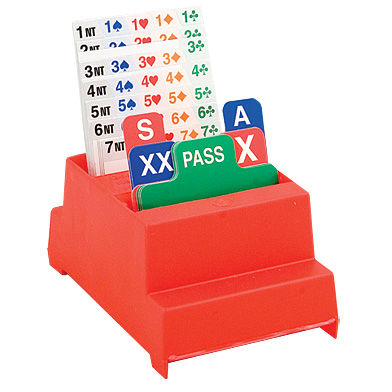This is a text and image widget
Anything you place in the left hand column will appear on every page of the site
Rules
Dummy's Do's and Dont's
A. Limitations on Dummy; General Limitations
(a) Calling the Director: Unless attention has been drawn to an irregularity by another player, dummy should not initiate a call for the Director during play.
(b) Calling Attention to Irregularity: Dummy may not call attention to an irregularity during play.
(c) Participate in or Comment on Play Dummy must not participate in the play, nor may he/she communicate anything about the play to declarer.
B. Limitations Carrying Specific Penalty
(a) Exchanging Hands: Dummy may not exchange hands with declarer.
(b) Leave Seat to Watch Declarer: Dummy may not leave his seat to watch declarer's play of the hand.
(c) Look at Defender's Hand: Dummy may not, on his own initiative, look at the face of a card in either defender's hand.
Opening Lead out of Turn!
 The Five Options for a Faced Opening Lead Out of Turn
The Five Options for a Faced Opening Lead Out of Turn
(Law 54):
1. You may accept the lead from the wrong hand and see dummy before playing in proper sequence from your own hand.
2. You may accept the lead and become the dummy. (If declarer exposes one or more cards, he must spread his hand, becoming dummy).
3. You may require the lead – one time only from the proper opening leader – of the suit that was improperly led, and the penalty card is returned to the offender’s hand.
4. You may prohibit the lead – from the proper leader for as long as he holds the lead – of the suit that was improperly led, and the penalty card is returned to the offender’s hand.
5. You may leave the improperly led card on the table to remain a penalty card. The opening leader can lead as he chooses. If the correct opening leader retains or regains the lead, however, and his partner still has the penalty card, you will, each time before the defender leads, have the choice of exercising option 3, option 4 or option 5.
Pass out of Turn
LAW 30
PASS OUT OF ROTATION (Turn)
When a player has passed out of rotation and the call is canceled, the following provisions apply:
A. Before Any Player Has Bid
When a player has passed out of rotation before any player has bid, the offender must pass when next it is his turn to call.
B. After Any Player Has Bid
1. When a pass out of rotation is made at offender’s RHO’s turn to call after any player has bid, offender must pass when next it is his turn to call.
2. When, after any player has bid, the offender passes out of rotation at his partner’s turn to call,
(a) the offender must pass whenever it is his turn to call, and
(b) offender’s partner may make any sufficient bid or may pass, but he may not double or redouble at that turn.
3. After any player has bid, a pass out of rotation at offender’s LHO’s turn to call is treated as a change of call.
EXPOSURE OF DECLARER’S CARDS
LAW 48 ‐ EXPOSURE OF DECLARER’S CARDS
A. Declarer Exposes a Card
Declarer is not subject to restriction for exposing a card (but see Law 45C2), and no card of declarer’s or dummy’s hand ever becomes a penalty card. Declarer is not required to play any card dropped accidentally.
B. Declarer Faces Cards
1. When declarer faces his cards after an opening lead out of turn, Law 54 applies.
2. When declarer faces his cards at any time other than immediately after an opening lead out of turn, he may be deemed to have made a claim or concession of tricks (unless he demonstrably did not intend to claim), and Law 68 then applies.
Law 45C2:
Declarer is deemed to have played a card from his hand if it is:
(a) held face up, touching or nearly touching the table; or
(b) maintained in such a position as to indicate that it has been played.
 Law 42
Law 42